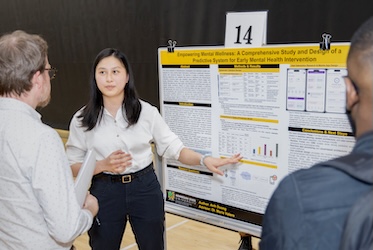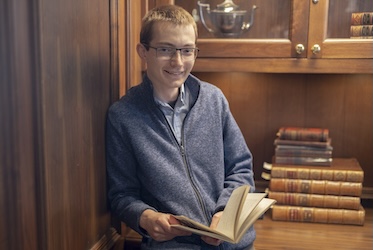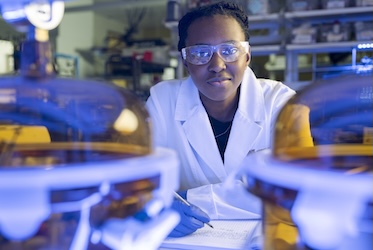
KSU neuroscientist awarded grant for research on women’s PTSD risk
KENNESAW, Ga. | Oct 26, 2020

Evidence shows that women are two times more likely than men to be affected by post-traumatic stress disorder (PTSD), a debilitating and costly mental health condition. Kennesaw State University’s Ebony Glover seeks to understand the biological factors behind that heightened risk through a grant she recently earned from the National Institutes of Health (NIH).
The three-year, $406,300 grant will enable Glover, an associate professor of neuroscience in the College of Humanities and Social Sciences, to gain a more comprehensive picture of sex-linked biomarkers for PTSD, which can lead to potential treatments that are more customized for this high-risk population.
“Finding effective preventative measures and treatments for PTSD in women is a national mental health priority,” Glover said. “Since sex differences in PTSD prevalence remain after controlling for many environmental factors, such as the type and degree of trauma exposure, there is a clear need to understand the biological mechanisms associated with increased female susceptibility in PTSD.”
Therefore, one of the study’s major goals is to clarify how ovarian hormones such as estradiol and progesterone influence fear-conditioning processes in women.
Glover explained that estradiol, a major growth hormone of the female reproductive system, has been shown to elevate PTSD risk in women through its effects regulating the body’s fear circuitry. However, there are notable inconsistencies in the literature when studying these interactions as related to specific fear learning and memory mechanisms and nonspecific fear and anxiety.
She also noted that there are even fewer studies focused on the effects hormonal contraceptives have on fear and anxiety, even though 85 percent of women in the United States will use those synthetic hormones at some point in their lives.
“The limited evidence base for sex-specific pharmacotherapy of PTSD is a major obstacle to the effective treatment of this disorder,” Glover said. “Our research contributions could offer critical insight into clinical practices that take into account women’s reproductive cycle and ovarian hormone levels when applying therapies.”
Glover credits the work of her Affective Neuroscience Laboratory team, consisting of dozens of undergraduate research assistants, for gathering preliminary data which helped support the feasibility of the study in her NIH grant application. That data was used to assess hormone-related factors involved in regulating emotions and the implications for treating anxiety disorders.
Finding ways to involve and encourage undergraduates while pursuing research activities has been a fundamental part of Glover’s career. “The success of this project and other studies has been critically dependent on the engagement of undergraduate student researchers in all aspects of the study, from data collection to the dissemination of results via conference presentations and manuscript publications,” she said.
In fact, this particular NIH award is known as the R15 or Academic Research Enhancement Award, which funds small-scale projects at undergraduate-focused institutions. Glover, who was previously awarded two NIH-funded postdoctoral fellowships that fueled her research interest, explained that some of the funds will be used to pay undergraduate and graduate students’ stipends for working on the project as well as provide monetary incentives to study participants.
“I am thrilled to receive a R15 grant from the National Institutes of Health,” said Glover. “These funds will strengthen our research program and broaden opportunities for students to engage in high-impact research in the biomedical research field.”
– Joëlle Walls
Photos by David Caselli
Related Stories

Passions spark innovation at Kennesaw State Symposium of Student Scholars

First-year Kennesaw State student, author recognized as versed local historian

Kennesaw State students to present research at Symposium of Student Scholars

Chemistry student engaged in sustainable catalyst research through Kennesaw State's First-Year Scholars program
A leader in innovative teaching and learning, Kennesaw State University offers undergraduate, graduate, and doctoral degrees to its more than 47,000 students. Kennesaw State is a member of the University System of Georgia with 11 academic colleges. The university’s vibrant campus culture, diverse population, strong global ties, and entrepreneurial spirit draw students from throughout the country and the world. Kennesaw State is a Carnegie-designated doctoral research institution (R2), placing it among an elite group of only 8 percent of U.S. colleges and universities with an R1 or R2 status. For more information, visit kennesaw.edu.















